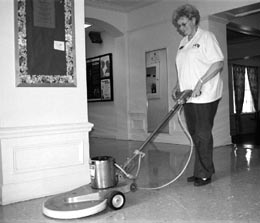By Priya Abraham staff reporter Between taking out the trash and cleaning the showers, residential housekeepers like Sonia Gallegos struggle to live on their salaries. "I usually collect the cans that are here for recycling, and I sell them for extra money," she said.
This spring, the TCU Staff Assembly is working toward increasing the salaries of non-exempt staff members, employees who are paid hourly and are eligible for overtime pay. Chairwoman Mary Lane said during the recession in the early 1990s, people could be hired at low salaries. Adjustments were not made in following years, however, and current salaries are not competitive with the market, she said. At TCU, the entry-level salary in the lowest pay grade for regular employees is $5.73 an hour, amounting to $11,915 a year before taxes. According to the Federal Register, for a family of four the poverty line falls at $16,700 a year. However, John Weis, director of Human Resources, said poverty line figures are misleading. "There are situations where (staff members) may work at TCU at that rate, but they have spouses working, or they have another job themselves," he said. Weis said Human Resources officials have no way of knowing if staff members' salaries are their sole or supplemental incomes. "You can see how many people like to work here," Lane said. "They want to work here - they just can't afford it." Gail Truitt, a residential housekeeper, said she would like to see better compensation for the work housekeepers do. "It is physical labor," she said. "Unless you've never left here with your back aching and your feet on fire and your arms aching because you've been lifting trash, you don't know what it's like." Truitt, who's worked at TCU for almost nine years, said after taxes, medical insurance, social security payments and bills, she has $200 a month left for groceries and living expenses. Truitt said raises have been small for housekeepers, with around a 25-cent increase to the hourly wage. "Some days (housekeepers) get real disgusted," she said. "They can't see the light at the end of the tunnel." Weis said starting salaries of employees at businesses such as Tarrant County College, the Fort Worth Independent School District, Harris Methodist Fort Worth Hospital and the Osteopathic Medical Center of Texas ranged from $6.75 to $8.80 as of September 1999. Last year, retirement benefits increased from 6.5 to 8.5 percent of base pay for non-exempt staff. Salaries also went up $600 across the board. However, it is still difficult to hire and retain workers, Weis said. "There's a buyer's market now for employees," Weis said. "People will look and see where they'll make higher salaries." Barbara Hancock, a housekeeping supervisor for Residential Services, said job benefits are good but employees should be compensated for unused sick leave. "It would cut down on absenteeism if they paid even half of it back," she said. Gallegos said life has improved since she quit her second job and went on welfare. "I didn't have any time for my baby," she said. "She was 1, and I was thinking, 'Oh god, I'm missing her.'" Gallegos said she didn't want people to pity her though. "Even if I don't have any money left, I've paid all the bills," she said. "I'm happy."
Managing editor Kristen Naquin contributed to this report.
Priya Abraham
By Natascha Terc staff reporter During his 52 years as a businessman on Berry Street, Marvin Schuster, 78, has witnessed the street's many changes. "Believe it or not, I remember when Berry Street was just two lanes," said Schuster. "It was called the Miracle Mile."
Linda Clark, chairwoman of the Berry Street Initiative and a 1968 TCU alumna, said $1.5 million came from the 1998 Capital Improvement Program bond election. With the support of Congresswoman Kay Granger, $700,000 in federal funds has also been granted to the Berry Street project. Granger said she was proud to secure the grant because urban revitalization is critical. "This project will bring neighborhoods together by making the parks, churches and shopping areas more accessible to pedestrian traffic," she said. Don Mills, vice chancellor for student affairs, said the city of Fort Worth has asked TCU to participate in the planning process.
Mills said the first renovations will most likely be street repairs, the installation of common lighting, signs and a median to fix up the public area. Clark said community leaders and Initiative staff will meet over the next few weeks and will select a project on which to spend the funds. "We do know that $300,000 of the grant will be spent for the design consultants at the Goodman Corporation," she said. Clark said the Phase I design plans will be presented to the Fort Worth City Council this month for approval. Schuster, founder of Marvin Electronics and owner of various properties on Berry Street, said although his business is now on Hulen Street, he still drives down Berry Street two or three times a week to see what changes are being made. "Last week, I got through repairing all the trim on the front of Record Town," Schuster said. "We believe in keeping up our properties."
Natascha Terc
Editor's note: This is the first in a series of articles profiling the 21 task forces that make up the Commission on the Future of TCU. By Reagan Duplisea staff reporter TCU needs to increase graduate student stipends to attract top candidates to the university's small programs, said Ray Drenner, a professor of biology and member of the Graduate Education Task Force. "The stipends themselves in some areas are not keeping up with the institution's cost," Drenner said. "Some are a thousand dollars less, and some are thousands of dollars less (than other institutions)." Stipends, including a monetary award and tuition hours, are awarded by each department. A graduate student's stipend in the art and art history department is about $6,000 per year and a stipend in the English department is $9,150 per year. A chemistry department stipend is $13,750 per year at TCU but $15,559 per year at Tulane University. Task force members said they realize how important graduate programs are to undergraduates and to the university itself. Karyn Purvis, a graduate student in the child development laboratories in the psychology department and task force member, said graduate students help in the department's undergraduate research laboratories. "Having the graduate students helps us empower our labs," Purvis said. "This helps undergraduates get research onto their résumés." Alan Shepard, chairman of the English department and faculty facilitator of the task force, said the task force is not aiming to give the administration a specific blueprint on what should be done in the graduate studies program. "About half the people on the committee are not experts in the graduate education subject," Shepard said. "Our aim is to think philosophically about what's going well, what's not going well and what we can do." Drenner said the task force has been trying to get an overall grasp on graduate study programs at TCU by asking for letters and receiving presentations by department chairpersons. Mark Thistlethwaite, the Kimbell chair of the art history department, said he gave a presentation to the task force on his department's new master's degree program. One of his main concerns is stipends, he said. "One of the major issues is the increase in funding to attract students and support them while they're here, especially with research projects," Thistlethwaite said. "We're a small program. We've been able to fund students so far." Drenner said the task force's challenge to look at all the graduate programs on campus has not been easy, but he has found serving on the task force a rewarding experience. "I've been here 22 years, and I've learned a lot about the university that I never would have known, especially about other departments," Drenner said.
Reagan Duplisea
By Jaime Walker staff reporter Complaints from students and faculty members regarding the final exams schedule has led several Student Government Association officers to keep the issue on their list of priorities. Brian Casebolt, chairman of the Academic Affairs Committee, said his committee will be exploring the issues surrounding the timing of finals. Although he said the committee has not yet met this semester, the finals schedule will be discussed at its first meeting. "The finals plans are of utmost importance and a top priority for Academic Affairs," he said. "Because it is a top priority for students, it is a top priority for us, too I want the committee to take ownership of the work we do. They need to believe in what we want to do." Sara Donaldson, current House vice president and former Academic Affairs chairwoman, said more than 800 out of 1,000 students polled via e-mail during Spring 1999 supported a revised finals schedule. The revision called for an additional dead day in the middle of the finals week, she said. "A lot of people said they had three (exams) right in a row," Donaldson said. "They didn't have a chance to breathe." Because she received such a large amount of student support for the revision, Donaldson said she presented it to members of the Faculty Senate, who said they would support it. However, during a forum Donaldson coordinated in Fall 1999, some faculty members and students expressed concerns about the plan. SGA President Ben Jenkins said faculty members said the proposed plan would not be in the best interest of the university because it would cut one class day from the academic calendar. "The faculty has a legitimate concern," he said. "We want to have more conversations with them before we make any proposals." The Executive Board is composed of the leaders of all House of Student Representatives committees. Everything considered by the House goes before the Executive Board. Jenkins said the House would support a revision to the finals schedule but wants to be cautious because changes would have a profound impact on the university system. "We want to do the big things right the first time," he said. "We don't want to be hasty and wrong." Students in favor of the plan said it would decrease stress around finals, benefiting both faculty members and students. "Faculty always have to deal with rescheduling senior finals, and this would make things so much easier," said Debra Noll, a senior Spanish major. "Changes would be great for us, too, because finals would be spread out." The Academic Affairs Committee meetings, along with the meetings of all other House committees, are open to the student body. Casebolt said all students are welcome to attend and discuss relevant issues. Anyone interested in participating in House committees can contact the SGA Office at 257-7924.
Managing editor Kristen Naquin contributed to this report.
Jaime Walker |
| The TCU Daily Skiff © 1998, 1999 Credits |
 Gallegos, a single mother of three, works
a 40-hour week and claims welfare. From $418 every two weeks, she pays
utilities and baby-sitting fees for her 2-year-old daughter. Gallegos said
she limits grocery spending to $60 and saves any extra for emergencies.
Gallegos, a single mother of three, works
a 40-hour week and claims welfare. From $418 every two weeks, she pays
utilities and baby-sitting fees for her 2-year-old daughter. Gallegos said
she limits grocery spending to $60 and saves any extra for emergencies. Schuster will again witness changes along
Berry Street because of a $2.2 million grant.
Schuster will again witness changes along
Berry Street because of a $2.2 million grant.